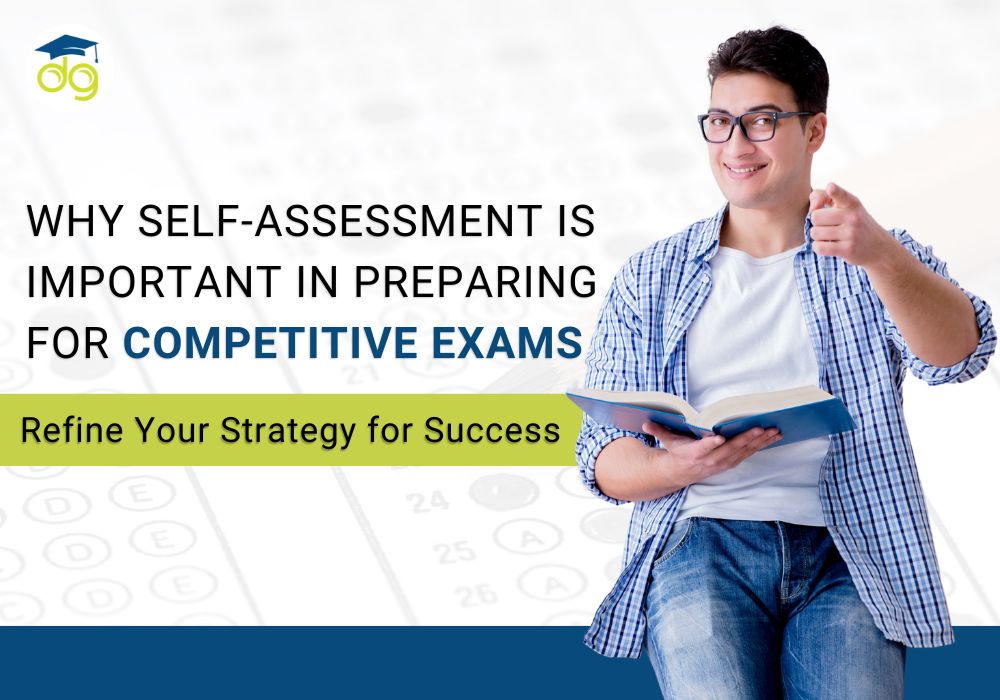Why Self-Assessment is Crucial for Competitive Exam Success: Refine Your Strategy Today
Boost Competitive Exam Prep with Effective Self-Assessment Strategies
This is particularly true of studying for Indian competitive exams. Be it the UPSC Civil Services Exam, JEE, NEET, or SSC, it is not so much the hours spent studying as how one studies. With the right strategy, you can maximise your efficiency, refine your approach, and increase the chances of cracking any competitive exam. And that is a pretty effective tool: self-assessment.
Competitive exams are, indeed, a maze of subjects, huge syllabi, and endless lists of tasks. So, it is basically important that you should be able to assess your progress, the strength, and the weakness, and then adjust your preparation strategy. In this blog, we are going to discuss the role of self-assessment in competitive exam preparation, explore the tools and the methods you can use, and explain exactly how you would analyse your performance in order to refine your study approach.
1. What is self-assessment in the preparation of an examination?
Self-assessment is the checking or evaluation of one's performance related to learning and examination preparation. It involves diagnosing your own strength and weakness, testing one's knowledge, and adjusting one's strategy to do better. Self-assessment enables one to trace progress, keep on the track, and avoid common pitfalls like over-confidence and procrastination.
Types of Self-Assessment:
Knowledge Based Self-Assessment: This would be measuring how well you know and remember the core concepts, facts, and theories. So a practice question in Physics JEE or General Studies UPSC may contain tests for definitions, formulas, or the historical events.
Skill-Based Self-Assessment: This is about how well you could apply your knowledge. For instance, can you solve more complex maths and engineering problems? Can you pen out structured answers at par with the UPSC Mains?
Performance-Based Self-Assessment: This assesses performance under simulated real examination conditions. You could measure your capacity to manage time, accuracy, and pressure by taking mock tests and analysing the results.
2. Why is Self-Assessment Important in Preparing for Competitive Exams?
Self-assessment becomes important for a number of reasons:
Objective Analysis of Performance
It is easy to lose one's way during daily preparation. Self-assessment will allow you to take an objective view of your progress-whether your strategies are impacting or if a change is in order. You will get back on track for your goals and will have the clarity for change where needed.
Strengths vs. Weaknesses
This way, you could understand which area you are good at and where you need special attention. For example, you might be scoring regularly well in subjects such as Chemistry (NEET) but low in Physics. In this case also, you can benefit from your competition by providing individualised study plans and giving extra time to weak areas.
Boosts Motivation and Confidence
Mock tests or quizzes can help you to track improvement and motivate one self with regard to improvements. Your scores will improve while this will be the fuel that would provide you with confidence to keep moving forward. Sometimes it's the small wins that really make a big difference in your morale and encouragement to keep going.
Strategy Refining
Self-assessment doesn't just involve checking results but includes that data to work on improving your strategy for studying. Regular evaluation will show you what's effective and what's not. If you find that you're spending too much time on one subject or type of question, you can change your approach to become a better version.
Avoids Complacency and Overconfidence
Without monitoring, you stand the chance to become complacent as well, and this is particularly more dangerous if you are scoring good marks in practice tests-this can result in poorly performing during real exams. Self-assessment will keep you grounded by keeping track of real progress and reduces the chances of overestimating readiness.
3. Tools and Methods for Effective Self-Assessment
There are many tools and techniques through which you may add self-assessment to your study routine. Let's discuss the most effective ones:
Mock Tests & Practice Papers
Why They Matter: Mock tests resemble an actual scenario of the test; hence, you get a glimpse of how you are going to manage the time while solving questions. Therefore, it will give you an idea of how prepared you are as well as which topics have to be paid extra attention to.
Frequency: You should take mock tests with a regular frequency, at least every week, or every fortnight. This will help you monitor your progress and see if you're improving each day.
Analysis: The score alone is not enough to be focused on; you must analyse sections in which you go wrong, how much time is spent over each question, and the kind of mistakes you made. It will help you refine your strategy.
Self-Quizzes and Flashcards
Use apps like Anki, Quizlet, or physical flashcards to check how well you are remembering facts and concepts. Lastly, frequent testing of your memory is important, especially for those subjects with high factual contents, like History or Biology.
Track which flashcards you tend to mess up on often and focus on re-revising those to fill in retention gaps
.
Daily/Weekly Progress Tracking
Keep a diary of progress or a spreadsheet to track what you have read each day. That way you can see your consistency, if you don't, everything will be accounted for
Formulate short-term goals-those easily achievable, such as completing a chapter or topic-and mark them off when they fall in place.
Error Logs
Maintain an error log and mark the mistakes made on practice tests or daily quizzes. This will make you more vigilant on patterns that you commit and will not repeat that mistake.
Review your error log occasionally to assess your performance and to change course if need be.
Peer Reviews and Group Studies
Peer review or group study: You can seek peer reviews by discussing challenging topics with other aspirants. This way, you may hear different perspectives that would reflect some gaps you haven't addressed.
Time Management Tracking
Use apps for tracking time such as Toggl or RescueTime to see how much time you are spending on each subject. This will allow you to know which subjects you spend too much or too little time on.
Spend a few days of the week to reflect on your motivation, focus, and emotional state. Reflecting through journaling how you feel about your progress can help you realise whether you are in the right mindset to prepare for exams.
4. How to Interpret Self-Assessment Results
Knowing how to interpret results of self-assessment is important in order to refine study strategy.
Error Finding
Notice repeating mistakes in the kind of mistakes you are making. Do you get to understand how you go wrong about misinterpreting the questions, or how you continuously tackle wrong topics? That's where you should pay close attention.
Time Management Review
Do you succeed in answering all questions in the given time? Then is it really because you have poor time management, or because you are not well-prepared about a particular topic? So change your study schedule based on this
Track Your Improvement
Compare your scores in each mock test. Are you getting speed and accuracy? If not, then you have to re-evaluate your preparation methods and fill the gaps.
Knowledge Gaps
Aware of the knowledge gaps from your self-assessment. Learn the topics more deeply and prepare well before the actual exam.
5. Tips for Effective Self-Assessment
Be honest with yourself: Self-assessment works only if you are ruthlessly honest about your mistakes and weaknesses; don't ignore areas where you're weak.
Track both short-term and long-term goals: It's good to constantly focus on short-term goals like this week, "I'll complete this chapter," but avoid losing sight of long-term goals, like preparing to sit for the exam.
Over-Analysis Avoid: Take actionable feedback from your self-assessments. Spending too much time working on every detail can bring unnecessary stress and overthinking.
Regularity: The way to make self-assessment a habit is by doing frequent, small assessments rather than periodical deep dives into your performance.
Using a Combination of Methods: A good mix of various tools—mock tests, quizzes, error logs, etc.—will give you an effective understanding of your progress.
6. Common Pitfalls to Avoid in Self-Assessment
Overdependence on Test Scores: Do not rely only on the scores of mock tests for you to claim that you have prepared well. Scores are just one aspect of preparing for your examinations; you can be conceptually clear or good at time management.
Avoiding Weak Areas: If you have been weak in some areas and have not been able to make adequate progress, do not avoid them. Instead, you should strictly practise these areas so that you get better at them.
Comparing with Others: There must be some form of comparison that is motivating, but comparing with friends can be over pressure developing. Keep up the pace of progress and growth.
7. Developing a Habit of Self-Evaluation
To perform self-evaluation successfully in your routine:
Integrate it into Your Daily Calendar: Do not treat self-evaluation as something that you will get to "later." Make it part of your study routine for the day or week.
Create feedback loops: regularly check your scores of mock tests and quizzes as well as any peer reviews received. Adjust your study program using these results to keep on track.
Conclusion
Self-assessment is not only an assessment tool of one's improvement in a specific area, but it is a technique that promotes continuous improvement. Constant review of strengths and weaknesses will enable you to refine your plan of preparation and remain on course toward the set objectives. Consistency and honesty are inevitably two aspects that this process demands. So begin to incorporate self-assessment into your daily routine today as well, and soon enough you will realise the difference it brings forth in terms of preparing for an exam.
For more tips and exam specific guides, visit Skoodos Bridge where You can find information on coachings and other materials to help you prepare for the exam.
FAQs
Q1: How often should I take mock tests for self-assessment?
A1: Plan to take one a week or every other week, depending upon how long your test is. This will help you track your progress and where you need to make changes.
Q2: How can I effectively analyse my results for my mock tests?
A2: Not only on your marks, but consider the time you took for every section, where you went wrong, and what was your average mistake.
Q3: Can one self-assess himself without going through peer review?
A3: Yes, although peer evaluation is good, tools of self-assessment like mock tests, flashcards, error logs can guide through your preparation.
Q4: If I keep repeating the same things in self-assessment, what should I do?
A4: Go through these areas frequently. Break up the topic and practise these small chunks until you overcome those impediments.
Categories
Archives
- November 202512
- October 202521
- September 202520
- August 202522
- July 202524
- June 202524
- May 202526
- April 202530
- March 202523
- February 202513
- January 202523
- December 202429
- November 20246
- September 20245
- August 202422
- July 202415
- May 20249
- June 202424
Similar Posts

Voice-Based Learning Apps: The New Trend in Exam Preparation
by Skoodos Bridge

Top Untapped Indian Cities Ideal for Niche Exam Coaching Institutes
by Skoodos Bridge

Hostel vs PG vs Rent: Best Stay for Coaching Students in India
by Skoodos Bridge

Village Coaching Centres Transforming Competitive Exam Prep in India
by Skoodos Bridge

Gamification Psychology: Transforming Exam Preparation into Play
by Skoodos Bridge

Time Zone Study Scheduling for Indian Students in Global Coaching
by Skoodos Bridge

Parent Communication Strategies for Managing Exam Family Pressure
by Skoodos Bridge

Budget Breakdown: Cost Analysis of Top JEE Coaching Institutes 2025
by Skoodos Bridge

Color Psychology in Note-Taking for Better Memory and Learning
by Skoodos Bridge


Leave a Comment